In this article, the author discusses what happens when someone gets their second DUI in California. Driving under the influence (carelessness) can result in a multitude of penalties including but not limited to, court arraignment (or DUI) hearing, prolonged driver’s license suspension, and higher car insurance rates if you are facing a DUI.

What Is a DUI Arrest?
Driving under the influence of alcohol, drugs, or both is a DUI arrest. A first offense is a misdemeanor and the offender will generally be required to complete 52 weeks (eighteen 20-day periods) of Alcoholics Anonymous meetings, education classes, or community service to avoid jail time. A second offense is usually charged as a felony and the offender may be sentenced to a year or two in jail.
What Happens After a Second DUI in California?
If you have a second DUI in California, the consequences can vary depending on what type of DUI you’ve received. And your second DUI can be more complicated than your first offense. You will learn again virtually all penalties In DUI classes like – jail time and fines to license suspension etc.
A second DUI in California is less lenient by a judge for the offender who committed the crime. If you know more about the second DUI offense in California, you can be better prepared and fight against your charges.
Constitutes a Second Offense DUI
If you have been convicted of two DUIs within 10 years, your license may also be suspended for a long time. And it counts as a “prior” DUI, making it your second DUI offense. With laws becoming stricter on drunk driving in California, make sure that you know the ramifications of a DUI. Driving privileges are no longer the focus of punishments – instead, a second DUI can lead to jail time, fines, and hefty probation fees.
On the other hand, if you are involved in a DUI offense and the conviction is not proven, you are discharged from the case. And the date you were arrested goes back ten years. In some cases, the penalties for a DUI may not be as severe as many might think.
The DUI you receive will be processed by two separate departments – the California DMV and the criminal justice system.
Administrative penalties for a second offense DUI in California
From suspension notices for drunk driving in California, the DMV will automatically suspend your license if you do not apply for a hearing within ten days. The fines for this include:
- License suspended for at least one year
- If you are waiting on applying for “restricted” driving privileges, the process can take up to three months
- To get your driving license back, you will need expensive SR-22 insurance to reinstate it.
Criminal Penalties for a Second DUI
If you have a DUI that is not your first offense, the punishment can be very harsh and may include some fines including:
- He is being sentenced to spend at least 96 hours in prison. Unlike a first offense DUI, you usually can’t get it pardoned and the maximum prison sentence is one year, instead of 6 months.
- In the second DUI, you must pay the penalty of $390 to $1000, but the court will add ‘‘penalty appraisal,” which increases your total to almost $2000. But the cost of second DUIs goes far beyond this.
- You should attend those DUI classes, which can range between 18 and 30 months of classes and much longer sessions.
- You could face alcohol treatment, drug treatment, or other court-ordered penalties while on DUI probation for the next three to five years.
- You must install an interlock device on your car that is hard to avoid and this device can shut off the engine if you are drunk.
- If you have a DUI, your record will remain for ten years. If you have a previous conviction, it will count as your third time, and you face felony DUI charges.
Other Consequences of a Second Crime DUI
People convicted of a DUI have to face administrative and criminal penalties, such as:
- Rejection or dismissal from the job
- College or university rejection
- Refuse to serve in the military
- denial of a loan or financial aid
- The DMV puts several points on your Negligent Operator Treatment System, which can increase your insurance premium significantly



